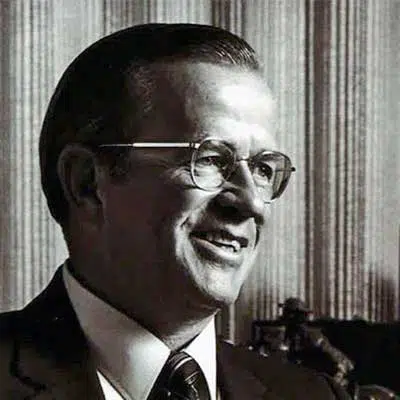Dee Hock, who died Saturday at 93, may not have single-handedly founded the modern electronic payments industry, but he came closer than anyone else to claiming that mantle. He is widely credited as the force that harnessed a widely varied collection of banks to start the credit card system that ultimately became Visa. He then ran Visa Inc. from its inception in 1970 until his decision, in May 1984, to not only step down as chief executive but to leave the business world entirely.
He wasn’t idle. For the next eight years he pursued a path that he himself characterized as one of “ranch owner, recluse, student, and philosopher.” By 1992 he had become concerned with what he later characterized as an “epidemic of institutional failure” among businesses and governments. That concern led to his development of a concept of institutional organization he advocated for as a speaker and writer.
This “chaordic” concept, he said, embraced the idea of a merger of chaos and order, and laid the groundwork for his idea of societal organizations that, he wrote, “more equitably distribute power and wealth and are more in harmony with the human spirit and biosphere.”

But perhaps what he will be most remembered for is the leadership that brought order to what was, in in the very early days, a chaotic start to electronic networking for everyday payments between consumers and businesses. “Dee Hock was a giant. His vision for Visa improved and continues to improve the lives of people worldwide,” says payments-industry consultant Eric Grover.
Hock started out in banking in 1949, and by 1966 he was vice president and general manager of the BankAmericard department at the Seattle-based National Bank of Commerce, as well as chairman of the National Executive Committee of the BankAmericard issuing banks. As Hock explains on his site, deewhock.com, the National Bank of Commerce had become one of the first six U.S. banks to be licensed by Bank of America to issue what was then the BankAmericard credit card.
But trouble soon followed as failed credit controls and clearance issues plagued the system, leading to angry accusations and finger pointing among the banks, Hock recalls on his site. What the banks should have been pursuing, he writes, was a global system for “the exchange of value.” He exerted leadership in pursuit of that concept, and by 1970 he and a group of other bankers had forged “the first part of an organization unlike any that had ever existed before.”
That organization was National BankAmericard Inc., and Hock had been appointed its president and chief executive. “Within two years, operating problems and losses were under control and the business was highly profitable, growing at the rate of 50% compounded annually,” Hock recalls on his site. By 1975, the organization had assumed the Visa name.
“More than any other individual, [Hock’s] vision and dogged pursuit of it created the open, global general-purpose bankcard payment system we all today take for granted,” Grover says.
Hock may or may not have imagined in those early days that Visa would grow into the giant payments network it is now, and has been for years. But in his obituary for Hock, posted on Visa’s site, the current chief executive makes a case that Hock’s leadership laid the groundwork for what the network has become.
“For those of us who work at Visa, Dee Hock’s legacy lives on in the work we pursue every day to extend secure digital payments across the world,” Alfred Kelly says in that post. “Our purpose today — to be the best way to pay and be paid for everyone, everywhere — draws a straight line to the bold philosophy he put forth decades ago.”





